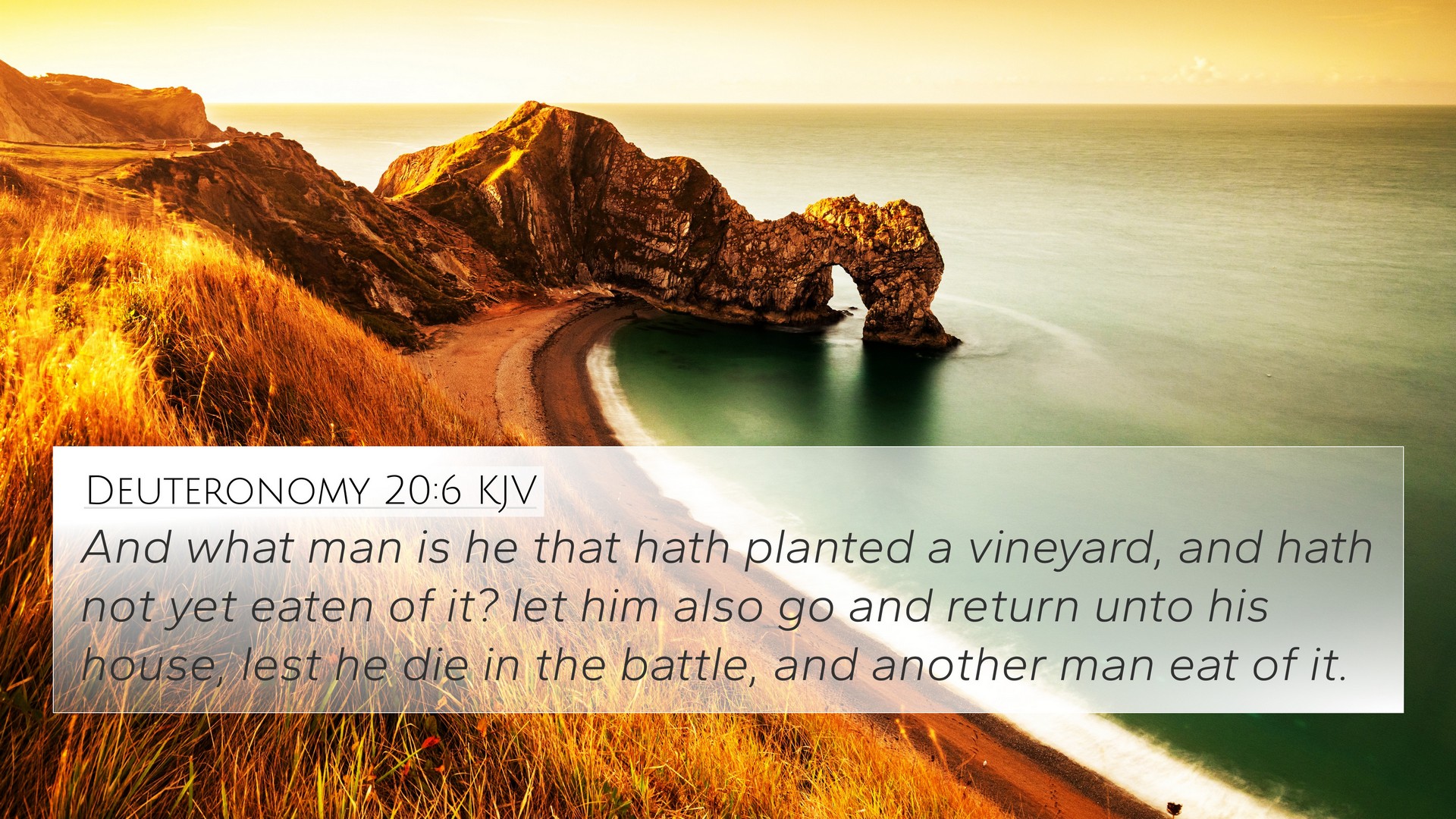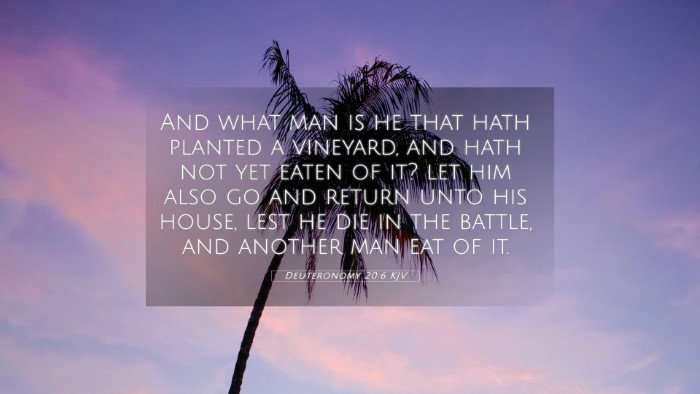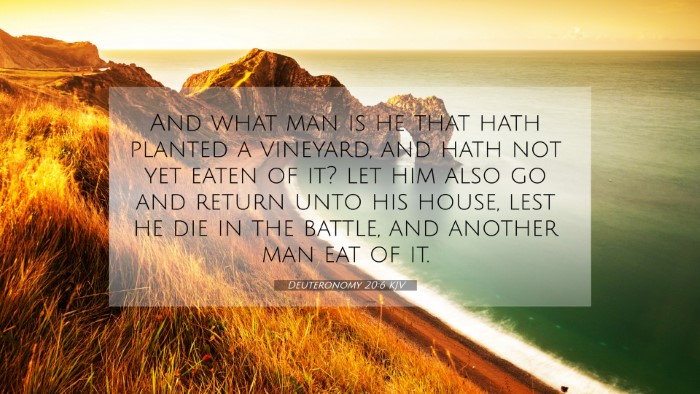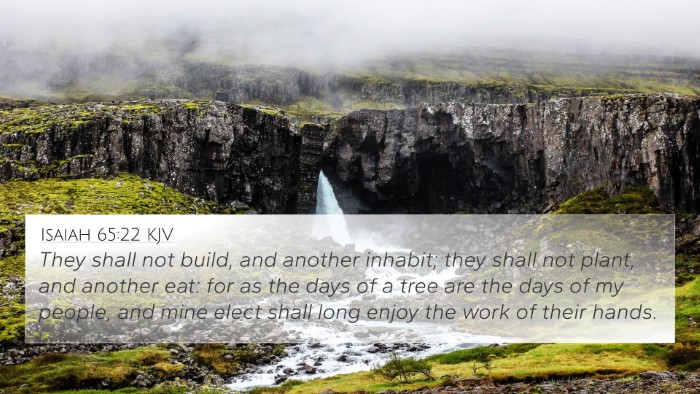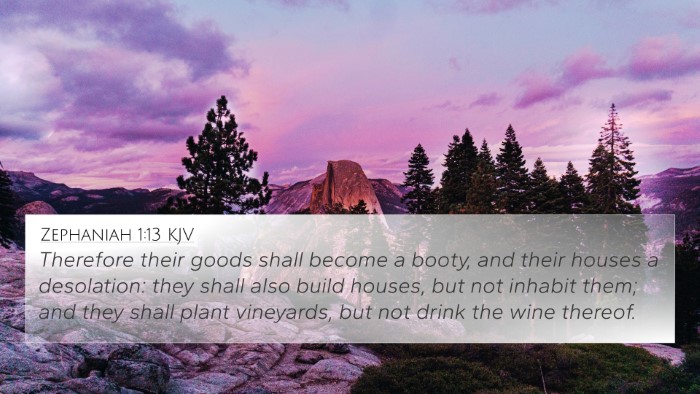Understanding Deuteronomy 20:6
Verse: “And what man is he that hath planted a vineyard, and hath not eaten of it? let him go and return unto his house, lest he die in the battle, and another man eat of it.”
Summary of Meaning
The verse from Deuteronomy 20:6 reflects a principle of provision and the prioritization of responsibilities before entering into battle. It underscores God’s concern for the well-being of His people, allowing those with new ventures, such as cultivating a vineyard, to return home rather than face the risk of losing their investments and the fruits of their labor.
Key Insights from Commentaries
-
Matthew Henry:
Matthew Henry emphasizes the humane consideration within the laws of warfare. He notes that this provision reflects God's care for individual welfare, allowing men who have invested in their agricultural pursuits to return home to enjoy the fruits of their labor, modelled on principles of justice and mercy.
-
Albert Barnes:
Albert Barnes points out the practical wisdom in this command, stating that a man who has planted a vineyard is likely to be more useful at home than in war, especially if he has not yet enjoyed its benefits. The allowance for retreat underscores God’s intention to protect the interests of His people.
-
Adam Clarke:
Adam Clarke remarks on the value of personal investment and the responsibilities that come with it. He observes that the law aims to ensure that individuals are not put in situations where they could lose the results of their hard work, thus highlighting the importance of family and agricultural life in the Israelite community.
Cross-References
To deepen the understanding of Deuteronomy 20:6, we look at related scriptures that echo its themes of responsibility, provision, and God's mercy:
- Leviticus 25:3-4: Discusses the law regarding fields and vineyards, emphasizing the importance of sabbatical rest.
- Proverbs 27:18: Explores the idea of tending to one’s own vineyard, symbolizing the care one must take of personal responsibilities.
- 1 Timothy 5:8: Stresses the importance of providing for one’s household, resonating with the personal priorities outlined in Deuteronomy 20:6.
- Deuteronomy 24:5: Highlights the importance of a newly married man, reflecting similar concerns for personal well-being before warfare.
- Ecclesiastes 2:24: Reminds us that enjoyment from our labor is a God-given right, much like the vineyard scenario in our verse.
- Luke 14:18-20: Jesus speaks about those who are preoccupied with new possessions, aligning with the concerns in Deuteronomy about neglecting responsibilities.
- Romans 12:19: Reflects God’s justice and care for the individual, ensuring that personal investment is respected.
Thematic Connections
Several overarching themes appear when analyzing Deuteronomy 20:6 in conjunction with other biblical texts:
- Divine Care: Both Deuteronomy and the verses in Ecclesiastes express God’s focus on the welfare of His people, emphasizing individual rights and responsibilities.
- Personal Responsibility: The significance of attending to personal affairs before engaging in broader responsibilities is a recurring theme, as illustrated in the aforementioned references.
- Balancing Duty and Personal Life: The connection with Proverbs and Timothy further reinforces the need to balance one’s duties towards both God and family.
Conclusion
In conclusion, Deuteronomy 20:6 provides a unique insight into God’s legislation regarding warfare and personal responsibility. The combination of commentary insights and cross-references illustrates a multifaceted understanding of the scripture, revealing God’s mercy and concern for the individuals in the community. By examining these connections, believers can appreciate the holistic picture of biblical teaching that emphasizes both divine justice and care for personal endeavors.
Further Exploration
For those interested in a detailed cross-reference approach, tools such as a Bible concordance or a Bible cross-reference guide can be invaluable. Exploring inter-Biblical dialogue encourages a richer understanding of these connections:
- Tools for Bible cross-referencing: Utilize a comprehensive Bible cross-reference system to discover links between verses effortlessly.
- Cross-reference Bible study: Engage in methods that systematically identify relationships within scripture.
- How to use Bible cross-references: Learning how to find connections will enrich your study and understanding of biblical themes.
